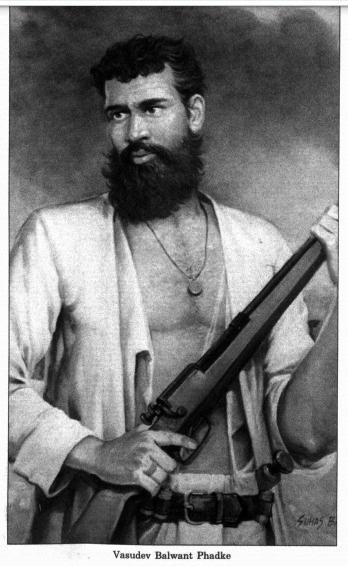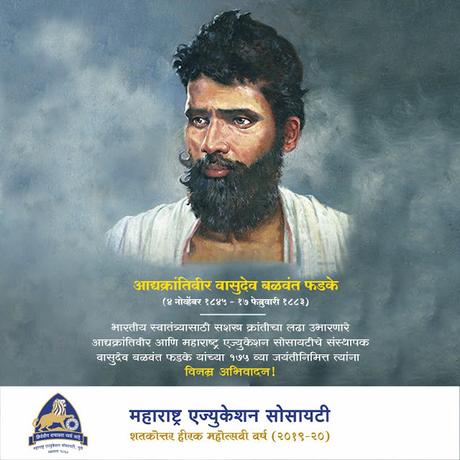British who came as traders, conquered our motherland and ruled it for centuries~ they were so clever and cunning that they wiped out our National identity, culture, symbols and ensured that we were tuned to act in the way they wanted ! .. .. the great rising of 1857 was described and ingrained in our minds to be more of ‘Sepoy Mutiny’ – an uncoordinated attempt by a few ! and not seen as the First war of Independence. The only freedom fighters we read in History was Indian National Congress as freedom was obtained without ‘drop of blood’.. .. in reality there were thousands of glorious country men who sacrificed their lives but were largely neglected. If you have a different opinion, please touch your heart and say – have we ever heard of a great freedom fighter “Vasudev Balwant Phadke”in our history books or elsewhere !!

While many freedom fighters when arrested were kept in State guest houses or their own homes and could pen letters to their kin – there were others who were sent to prisons – far away from their places and were tortured. One would immediately think of Andaman Cellular prison and its prisoners like Batukeshwar Dutt, Yogendra Shukla and Vinayak Damodar Savarkar, among others. Some famous inmates of the Cellular Shukla, Batukeshwar Dutt, Maulana Ahmadullah, Babarao Savarkar, Sachindra Nath Sanyal, Bhai Parmanand, Shadan Chandra Chatterjee, Sohan Singh, Subodh Roy, Vaman Rao Joshi and Nand Gopal. Several revolutionaries tried in the Alipore Case (1908) such as Barindra Kumar Ghose, Upendra Nath Banerjee, Birendra Chandra Sen too were lodged there. It is written that though Savarkar brothers Babarao and Vinayak were lodged there for two years at the same time, they would not know of each other’s presence.
Miles away lies Aden, a port city and capital of Yeman since 2015, located by the eastern approach to the Red Sea (the Gulf of Aden), some 170 km (110 mi) east of Bab-el-Mandeb. Surprised to know that the hero of the post was kept in prison here !!
The modern day Legislators earn good fee as salary and perks (some of them have wealth beyond imagination too !) – but the way they care for our freedom fighters !! - in 2004, there was an newsitem that freeze has at last been applied on more portraits in the already-cluttered Central Hall in Parliament ! Six of them of poets, patriots and politicians were added in August 2003 which took the total to 30. Accommodating more would have defied the aesthetic sensibilities ! The Committee on Statues and Portraits decided that while there would be a formal unveiling of a portrait, with flowers and speeches, they would not be housed in the main complex and instead, shifted to a new gallery in Parliament library building. One would be tempted to ask – if there is no place for those who fought and sacrificed for the Nation – where is the need for that building at all !!
Vasudev Balwant Phadke was undoubtedly among the first brigade of Indian revolutionaries and soldiers of freedom. His life was a saga of toil, sweat, blood and tears, the prototype of many martyrs after him. When even learned Pundits and great political leaders faltered in proclaiming our ideal of absolute political independence, Vasudev Balwant openly proclaimed it. He was the first Indian leader to go from village to village to preach the mantra of swara} and to exhort the people to rebel against foreign rule. Most portraits of the late 19th-century revolutionary Vasudev Balwant Phadke depict him with big brooding eyes, a ragged face and a bulky body. His posture signifies that he is a man with ferocious intent and purpose. Known as one of India’s first independence activists, the stories about Phadke valiantly fighting the British with a band of members of the Ramoshi community have created a mythic, cult-like status around him: to some, he is a modern-day avatar of Shivaji, a progenitor of Hindu civilisational supremacy.
Phadke’s arrival on the political scene in the second part of the 19th century coincides with the arrival of new narratives in Western India. Phadke’s rebellion of 1877 was the first Hindu rebellion after 1857 and his autobiography as the first-ever Marathi work about a rebellion against the British. Attaining Swaraj was not just a political matter for Phadke. Spirituality was deemed crucial to give pure meaning to militant action. Phadke’s influence was so powerful that the young Lokmanya Tilak is said to have taken sword-fighting lessons and participated in physical exercises overseen by the revolutionary. Inspired by Phadke, several others congregated at the premises of local temples to chart out their future for fighting for freedom of the Nation.

Vasudev Balwant Phadke (4 Nov 1845 – 17 Feb 1883) was an Indian independence activist and revolutionary who sought India's independence from the British Raj. Phadke was moved by the plight of the farming community and believed that Swaraj was the only remedy for their ills. He formed a revolutionary group of the Ramoshi people. The group started an armed struggle to overthrow the British Raj, launching raids on rich English businessmen to obtain funds for the purpose. Phadke came to prominence when he got control of the city of Pune for a few days after catching British soldiers off-guard during one a surprise attack.
In 1845, Phadke was in Shirdhon village of Panvel taluka, now in Raigad district, Maharashtra. As a child, he preferred learning skills like wrestling, riding over high school education. Krantiveer Lahuji Vastad Salve a then prominent social figure based in Pune was his mentor. Salve, an expert wrestler. It was during this period that Phadke began attending lectures by Mahadeo Govind Ranade which mainly focused on how the British Raj policies hurt the Indian economy. In 1870, he joined a public agitation in Pune that was aimed at addressing people's grievances. Phadke founded an institution, the Aikya Vardhini Sabha, to educate the youth.
Phadke was one the earliest person graduate from a British established institution in Bombay presidency. In 1860, along with fellow social reformers and revolutionaries Laxman Narhar Indapurkar and Waman Prabhakar Bhave, Phadke co-founded the Poona Native Institution (PNI) which was later renamed as the Maharashtra Education Society (MES). Through the PNI, he went on set up Bhave School in Pune. Today, the MES runs over 77 institutions in various parts of Maharashtra.
In 1875, after the then Gaekwad ruler of Baroda was deposed by the British, Phadke launched protest speeches against the government. Severe famine coupled with the evident apathy of the British administration propelled him to tour the Deccan region, urging people to strive for a free republic. He organised around 300 men into an insurgent group that aimed at liberating India from British rule. Phadke intended to build an army of own but lacking funds they decided to break into government treasuries. The first raid was done in a village called Dhamari in Shirur taluka in Pune district. Impressed by his zeal and determination, the villagers of Nanagaum offered him protection and cover in the local forest. The general plot would be to cut off all the communications of British forces and then raid the treasury. The main purpose of these raids was to feed famine-affected farmer communities.
Meanwhile, Daulatrav Naik, who was the main supporter of Phadke, headed towards the Konkan area on the western coast. In May 1879, they raided Palaspe and Chikhali, looting around 1.5 lakh rupees. While returning towards Ghat Matha, Major Daniel attacked Naik, and shot him dead. Phadke's plans to organize several simultaneous attacks against the British Raj nationwide were met with very limited success. He once had a direct engagement with the British army in the village of Ghanur, whereafter the government offered a bounty for his capture. Not to be outdone, Phadke in turned offered a bounty for the capture of the Governor of Bombay, announced a reward for the killing of each European, and issued other threats to the government. He then fled to Hyderabad State. A British Major, Henry William Daniell and Abdul Haque, Police Commissioner to the Nizam of Hyderabad, pursued the fleeing Phadke day and night. The British move to offer a bounty for his capture met with success: someone betrayed Phadke, and he was captured in a temple after a fierce fight at the district of Kaladgi on 20 July 1879 while he was on his way to Pandharpur
He was taken to Pune for trial. Ganesh Vasudeo Joshi, also known as Sarvajanik Kaka, defended his case. Phadke was transported to jail at Aden, but escaped from there in Feb 1883. He was soon recaptured and then went on a hunger strike, dying on 17 February 1883.
Phadke became known as the father of the Indian armed rebellion in that he provided the inspiration for fellow freedom fighters. Bankim Chandra Chattopadhyay's patriotic novel Anand Math incorporated various contemporary acts of patriotism performed by Phadke during his freedom struggle. As the British government did not like this, Bankim had to print up to five editions of the book to tone down these stories. In 1984, the Indian Postal Service issued a 50 paise stamp in honor of Phadke. A chowk in South Mumbai near Metro Cinema is named in his honor. VS Joshi’s Marathi biography Adya Krantikarak (First Revolutionary), is a prime example of that militant phase in India’s freedom struggle.
Instead of remembering these action heroes and reading their life history for inspiration, we sadly slipped into reading Simon Commission, Mercy of Cawning and plans of Dalhousie among other things as History in our Text books. To fully understand the sacrifices of Phadkes and others - legacy must be considered against the backdrop of the tumultuous historical period of late 19th century India.
Jai Hind ! ~ salute those numerous warriors whose blood and sacrifice gave us freedom.
With respects to all of them – S. Sampathkumar
4.11.2020.

